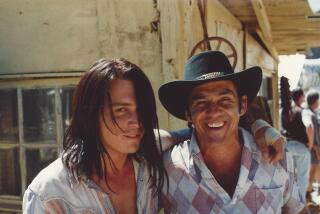Lost amid the ‘Little Ashes’
- Share via
“Little Ashes” is a trifling historical fantasy, gossip wrapped in gossamer, beautiful to watch but it takes only a light wind to leave the story in tatters.
The setting is an imaginary Madrid, circa 1922. The Catholic Church and the intellectuals are locked in a battle for the Spanish soul. At the university, ideas and emotions are roiling the lives of three friends, the esoteric is debated in bedrooms and bars over massive quantities of alcohol. They will grow into important creative forces: painter Salvador Dali, poet Frederico Garcia Lorca and filmmaker Luis Bunuel.
Throw in rumors of an affair between Dali and Lorca, a disaffected Bunuel departing for Paris with Dali soon following, a heartbroken Lorca struggling with his sexual orientation and you have some idea of the many loose threads of Philippa Goslett’s script that filmmaker Paul Morrison tries to stitch into whole cloth, a feat he never quite manages.
The most familiar face in the film will likely be Robert Pattinson, better known as the lean pale vampire whose flights through the midnight world of “Twilight” have set teenage hearts everywhere beating faster. He is the strange, shy Dali who turns up looking like he’s from an earlier era, all ruffles and velvet. Dali is a quick study though, and a few rips here and there and he’s fashioned himself into something both modern and unique, a trick that fails Pattinson, who is more parody than performance. Dali’s love affair with Surrealism has already begun, and he’s talented enough and vulnerable enough to catch Bunuel’s eye.
Played by Matthew McNulty, Bunuel is the one who will pull Dali into his inner circle, where experimentation and anarchy run high. Though Bunuel is seduced by Dali’s talent, it is Javier Beltran’s Lorca who will fall in love with the man.
Lorca and Dali are locked in a long, slow tease until a summer ocean swim leads to a kiss. For a while, it seems as if the relationship will turn into something interesting for them and for us as well. But it is a time of great repression and the affair becomes little more than a haunting memory, while the film dances lightly over potentially rich themes of homosexuality, the church and the times.
Soon Dali would leave Lorca and Spain to work and collaborate with Bunuel, including “Un Chien Andalou,” Bunuel’s legendary Surrealist short whose close-up of a woman’s eye as it is sliced by a razor shocked more than 80 years ago (and the few seconds used here earned the film “a brief disturbing image” warning from the MPAA -- some things are still shocking.)
Thanks to director of photography Adam Suschitzky, “Little Ashes” is beautifully spare in its look, and the pacing has a sort of decadent languor to it, opposites that in this case attract. It is the narrative that confuses, darting here and there, telling half stories before abandoning them for others as it tries to cover inner turmoil, creative turmoil, political turmoil, religious turmoil and a lot of other turmoil too exhausting to mention here.
With a nicely nuanced performance from Beltran, Lorca is the one we get to know and understand best, but he’s not on screen enough to become the strong center this film needs. “Little Ashes” is a case of too little of this and too much of that, and like the rumored affair, nothing of substance to hold on to.
--
--
‘Little Ashes’
MPAA rating: R for sexual content, language and a brief disturbing image
Running time: 1 hour, 52 minutes
Playing: In selected theaters
More to Read
Only good movies
Get the Indie Focus newsletter, Mark Olsen's weekly guide to the world of cinema.
You may occasionally receive promotional content from the Los Angeles Times.











